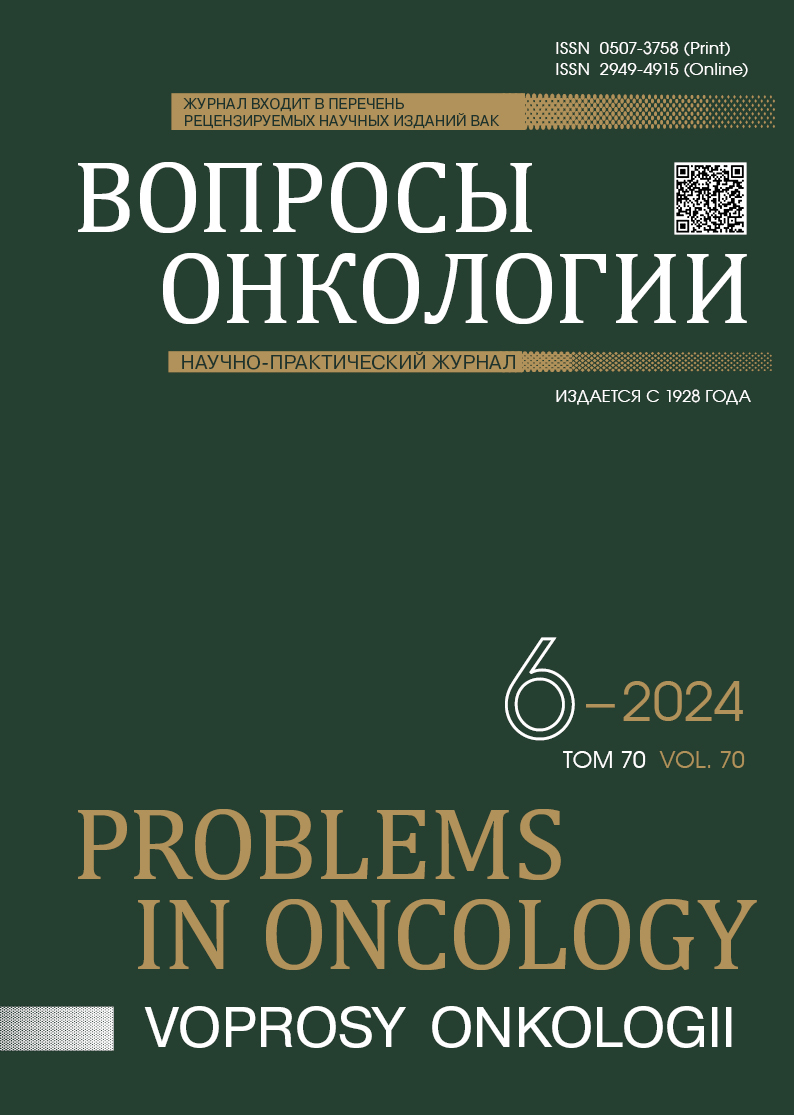Abstract
Introduction. Due to the fact that the treatment algorithm for gastrointestinal neuroendocrine tumors (GI NETs) is determined only by the localization of neoplasia and is focused on classification by the degree of differentiation, the search for additional prognostic markers is an urgent task.
Aim. The purpose of the study is to determine unfavorable prognosis factors in patients with GI NETs to improve the effectiveness of treatment for cancer patients.
Materials and methods. At the initial stage, the clinical and morphological features of 298 patients with GI NETs were analyzed. The subsequent phase of the study involved an investigation into the impact of peripheral blood parameters, systemic inflammatory factors and the proliferation index (Ki-67) on the progression of GI NETs (71 patients). The prognostic significance of type 2 diabetes mellitus, pre-treatment glucose level, body mass index and carcinoid syndrome were also assessed (34 patients with type 2 diabetes mellitus and 30 patients in the control group).
Results. Factors associated with an adverse prognosis and early progression of GI NETs were identified, including Ki-67 > 5 %, relative neutrophil count > 58.30 %, relative lymphocyte count ≤ 30 % and neutrophil-lymphocyte index (NLI) > 1.85. The optimal threshold value of the number of adverse prognostic factors at the cut-off point was 2: having 2 or more adverse prognostic factors at the time of the initial assessment negatively affected the progression-free survival (PFS) time of patients. The presence of more than 2 adverse prognostic factors in a patient increased the risk of disease progression by 67 %: p = 0.0013; OR = 1.67, 95 % CI 1.05-1.78.
Conclusion. Factors of unfavorable prognosis for the course and early progression of GI NETs were identified.
References
Chen Z.Y., Raghav K., Lieu C.H., et al. Cytokine profile and prognostic significance of high neutrophil-lymphocyte ratio in colorectal cancer. Br J Cancer. 2015; 112(6): 1088-97-DOI: https://doi.org/10.1038/bjc.2015.61.
Gaitanidis A., Patel D., Nilubol N., et al. Markers of systemic inflammatory response are prognostic factors in patients with pancreatic neuroendocrine tumors (PNETs): a prospective analysis. Ann Surg Oncol. 2018; 25: 122-130.-DOI: https://doi.org/10.1245/s10434-017-6241-4.
Luo G., Liu C., Cheng H., et al. Neutrophil lymphocyte ratio predicts survival in pancreatic neuroendocrine tumors. Oncol Lett. 2017; 13(4): 2454-2458.-DOI: https://doi.org/10.3892/ol.2017.5716.
Arima K., Okabe H., Hashimoto D., et al. Neutrophil-to-lymphocyte ratio predicts metachronous liver metastasis of pancreatic neuroendocrine tumors. Int J Clin Oncol. 2017; 22: 734-739.-DOI: https://doi.org/10.1007/s10147-017-1111-4.
Petrie H.T., Klassen L.W., Kay H.D. Inhibition of human cytotoxic T lymphocyte activity in vitro by autologous peripheral blood granulocytes. J Immun. 1985; 134(1): 230-234.74.
Tong, Z., Liu, L., Zheng, Y., et al. Predictive value of preoperative peripheral blood neutrophil/lymphocyte ratio for lymph node metastasis in patients of resectable pancreatic neuroendocrine tumors: a nomogram-based study. World J Surg Oncol. 2017; 15(1): 108.-DOI: https://doi.org/10.1186/s12957-017-1169-5.
Zhou B., Deng J., Chen L., Zheng S. Preoperative neutrophil-to-lymphocyte ratio and tumor-related factors to predict lymph node metastasis in nonfunctioning pancreatic neuroendocrine tumors. Sci Rep. 2017; 7(1): 17506.-DOI: https://doi.org/10.1038/s41598-017-17885-y.
Zhou B., Zhan C., Wu J., et al. Prognostic significance of preoperative neutrophil-to-lymphocyte ratio in surgically resectable pancreatic neuroendocrine tumors. Med Sci Monit. 2017; 23: 5574-5588.-DOI: https://doi.org/10.12659/msm.907182.
Gooden M.J.M., de Bock G.H., Leffers N., et al. The prognostic influence of tumour-infiltrating lymphocytes in cancer: a systematic review with meta-analysis. BJC. 2011; 105(1): 93-103.-DOI: https://doi.org/10.1038/bjc.2011.189.
Dikmen K., Kerem M. Stage predictivity of neutrophil/lymphocyte and platelet/lymphocyte ratios in pancreatic neuroendocrine tumors. Turk J Surg. 2020; 36(1): 1.-DOI: https://doi.org/10.5578/turkjsurg.4375.
Zhou Y., Li D., Lin Y., et al. Pretreatment hematologic markers as prognostic predictors of gastroenteropancreatic neuroendocrine tumors: a systematic review and meta-analysis. Onco Targets Ther. 2018; 11: 2489-2496.-DOI: https://doi.org/10.2147/OTT.S152657.
Salman T., Kazaz S.N., Varol U., et al. Prognostic value of the pretreatment neutrophil-to-lymphocyte ratio and platelet-to-lymphocyte ratio for patients with neuroendocrine tumors: an Izmir Oncology Group Study. Chemotherapy. 2016; 61(6): 281-286.-DOI: https://doi.org/10.1159/000445045.
Harimoto N., Hoshino K., Muranushi R., et al. Prognostic significance of neutrophil–lymphocyte ratio in resectable pancreatic neuroendocrine tumors with special reference to tumor-associated macrophages. Pancreatology. 2019; 19(6): 897-902.-DOI: https://doi.org/10.1016/j.pan.2019.08.003.
Андросова А.В., Орлова Р.В., Иванова А.К., et. al. Роль некоторых факторов системного воспаления в течении нейроэндокринных опухолей желудочно-кишечного тракта. Фарматека. 2022; 29(7): 83-88.-DOI: https://doi.org/10.18565/pharmateca.2022.7.83-88. [Androsova A.V., Orlova R.V., Ivanova A.K., et al. The role of some factors of systemic inflammation in the course of neuroendocrine tumors of the gastrointestinal tract. Pharmateka. 2022; 29(7): 83-88.-DOI: https://doi.org/10.18565/pharmateca.2022.7.83-88. (In Rus)].
Pusceddu S., Vernieri C., Di Maio M., et al. Impact of diabetes and metformin use on enteropancreatic neuroendocrine tumors: Post hoc analysis of the CLARINET study. Cancers. 2021; 14(1): 69.-DOI: https://doi.org/10.3390/cancers14010069.
Barrea L., Muscogiuri, G., Modica, R., et al. Cardio-metabolic indices and metabolic syndrome as predictors of clinical severity of gastroenteropancreatic neuroendocrine tumors. Front Endocrinol. 2021; 12: 649496.-DOI: https://doi.org/10.3389/fendo.2021.649496.
Серебренникова С.Н. Патофизиология метаболического синдрома: учебное пособие. С.Н. Серебренникова, Е.В. Гузовская, И.Ж. Семинский. Иркутск: ИГМУ. 2017: 52. [Serebrennikova S.N. Pathophysiology of metabolic syndrome: study manual. S.N. Serebrennikova, E.V. Guzovskaya, I.Zh. Seminsky. Irkutsk: IGMU. 2017: 52. (In Rus)].
Boccellino M. Anti-obesity effects of polyphenol intake: current status and future possibilities. Int J Mol Sci. 2020; 21(16): 5642.-DOI: https://doi.org/10.3390/ ijms21165642.
Colao A., de Nigris F., Modica R., Napoli C. Clinical epigenetics of neuroendocrine tumors: the road ahead. Front Endocrinol. 2020; 11: 604341.-DOI: https://doi.org/10.3389/fendo.2020.604341.
Vanacore D., Messina G., Lama S., et al. Effect of restriction vegan diet's on muscle mass, oxidative status, and myocytes differentiation: a pilot study. J Cell Physiol. 2018; 233(12): 9345-9353.-DOI: https://doi.org/10.1002/jcp.26427.
Giudice A., Montella M., Boccellino M., et al. Epigenetic changes induced by green tea catechins are associated with prostate cancer. Curr Mol Med. 2017; 17(6): 405-420.-DOI: https://doi.org/10.2174/1566524018666171219101937.
You J., Liu W.Y., Zhu G.Q., et al. Metabolic syndrome contributes to an increased recurrence risk of non-metastatic colorectal cancer. Oncotarget. 2015; 6(23): 19880-19890.-DOI: https://doi.org/10.18632/oncotarget.4166.
Tian S., Liu Y., Feng A., et al. Metabolically healthy obesity and risk of cardiovascular disease, cancer, and all-cause and cause-specific mortality: a protocol for a systematic review and meta-analysis of prospective studies. BMJ Open. 2019; 9(10): e032742.-DOI: https://doi.org/10.1136/bmjopen-2019-032742.

This work is licensed under a Creative Commons Attribution-NonCommercial-NoDerivatives 4.0 International License.
© АННМО «Вопросы онкологии», Copyright (c) 2024

